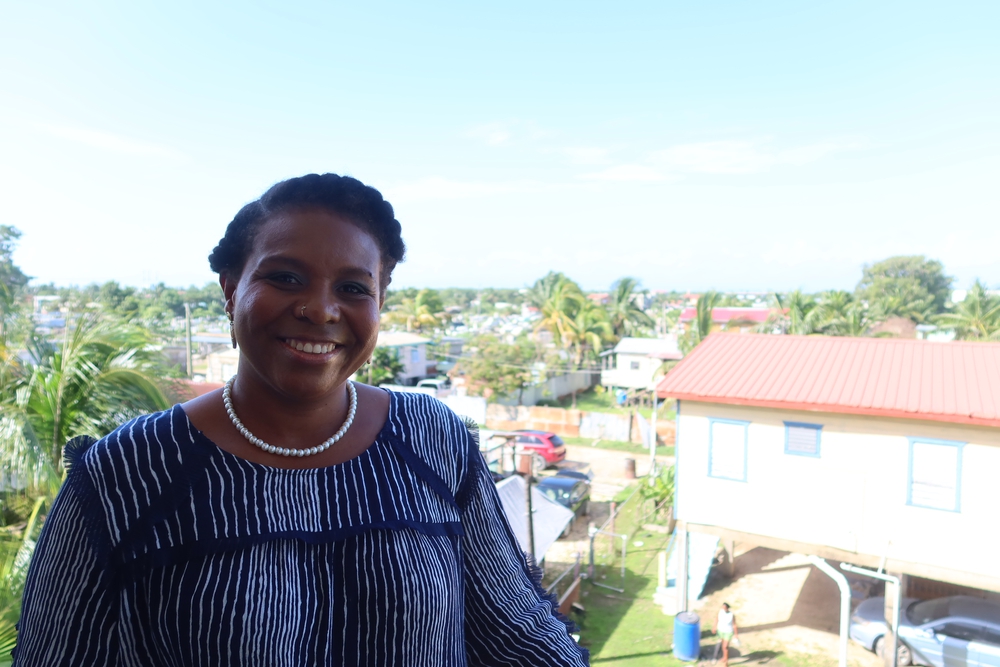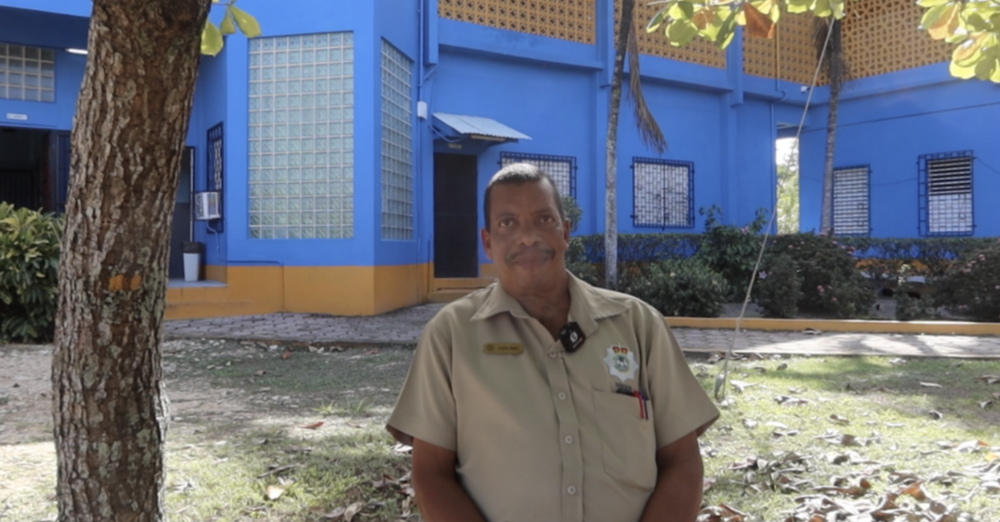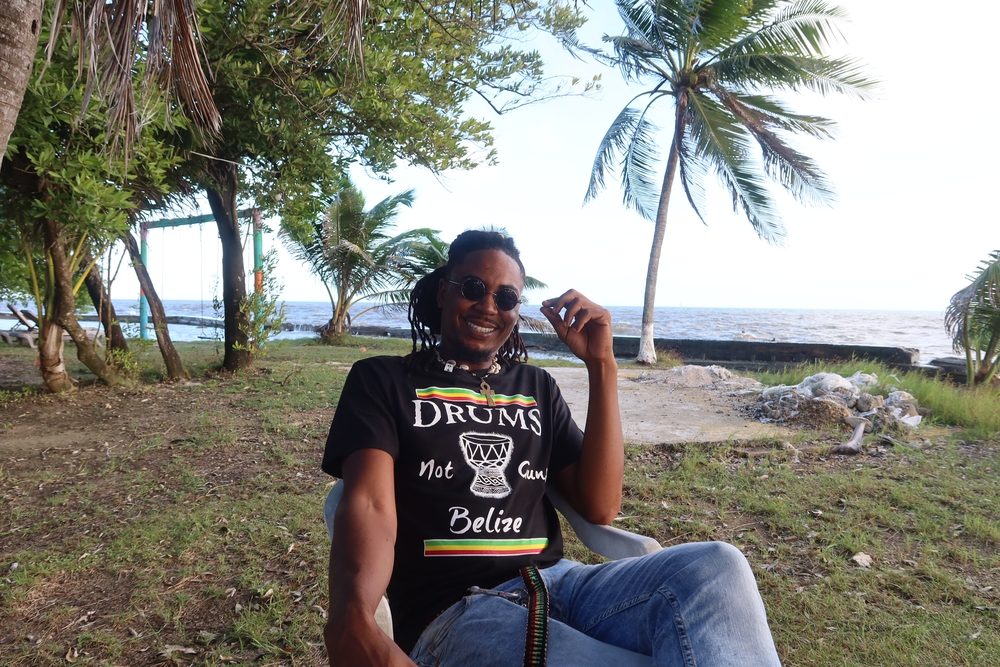I’m from Trinidad & Tobago, and I know that when people think of the Caribbean the first images are of beautiful beaches, colourful Carnivals, diverse people and vibrant island cultures. But the unfortunate reality lurking beneath that beauty is that for a region with less than 1% of the world’s population, it accounts for over 20% of the world’s homicides. Here in the Caribbean, we experience some of the highest murder rates in the world. In places like Belize, over 80% of those homicides are a result of firearms use.
Since 2022, MAG has been working alongside CARICOM IMPACS to support state agencies in the Caribbean to more effectively secure their stockpiles of weapons and ammunition, to reduce the risk of these weapons and ammunitions being diverted to criminal networks and armed gangs; further fuelling violence.
We are also supporting governments to destroy stockpiles that are obsolete, confiscated or unserviceable, so that they can better maintain inventories and prevent the diversion of weapons.
This isn’t just theoretical - there have been instances where ammunition or weapons that had been diverted from police stockpiles were used to commit murders or other crimes.
A lot of this work involves building trust with national authorities and staff so we can help them to improve their capacity to safely, securely and accountably manage national stockpiles of weapons and ammunition
Here in Belize, we conducted an assessment of their armouries and ammunition storage facilities, and are supporting the police, defence force and other security forces to make improvements - this could be anything from physical upgrades using locks, alarm systems and security cameras, to training staff on the safe disposal of ammunition.
Earlier this year we destroyed almost 800 weapons that were being held in in police custody, working closely with the authorities to gain their trust and help them manage their national stores.
We have also trained 23 members of the police and security forces on weapons and ammunition management, from the Belize Defence Force, Coast Guard, Customs Excuse Unit and Police Department.
In February 2024, we ran a targeted awareness raising campaign on gun safety in Belize, reaching as many as 280,000 people with life-saving messages. We shared ads on four major news networks in Belize, and across Facebook. A total of 60 ads were shared on national TV stations, and 30 were aired on the radio. The messages shared gun safety tips, as well as information on plans by the Belize police to destroy obsolete weapons unless claimed. Our safety messages on Facebook were seen 1,066,396 times on screen, reinforcing the importance of keeping communities safe from gun violence.
Here are just a few of the many people we are working with and speaking to about the issue of armed violence in Belize:

“In 2019 my cousin Rafael was shot. He was 27 years old. After spending a month in hospital, he passed away.”
Katie is a visual artist from Belize.
A lot of the crime that happens in Belize is connected to gun violence – it’s one of the main causes of murder in the country. Because of the prevalence of gun crime, people feel unsafe. We have seen lots of people apply for a gun licence so it’s important that people know how to safely use them, store them and not to injure themselves or others.
A lot of the gun violence here in Belize is related to gang activity. A lot of young men, and some young women, join gangs due to lack of opportunities or resources. This affects young people’s ability to be free in their own neighbourhoods. Even if you’re not in a gang, if you live in a certain area if can affect how you’re able to navigate life as a young person.
My aunt and uncle are still processing the loss of my cousin and have to live with that loss every day. It really impacted our family – something that happens in a matter of seconds impacts people’s lives forever. I’m sure it is triggering every time there is a news story about someone who has been shot or killed by gun violence.
As a visual artist, in 2015 I did an installation which was inspired by a young journalist who was killed by gun violence. I took all the newspapers from around the time he was killed and recorded all the names of other people killed by gun violence. I wrote the names in chalk and the names filled the entire wall – from top to bottom and left to right.
I try to use art to showcase lots of the issues relating to gun violence – for example people who survive shootings but may be left with physical disabilities. Film is a good medium to explore that. I recently started a new job in the media, which provides another opportunity to get the message out and share statistics of how many people are affected.
I see a lot of Belizeans who are living in grief or fear are trying to create community and work around the issues of gun violence. That makes me hopeful.”
Loretta Garbut, Corporal of Police in Belize.
Loretta recently joined one of MAG’s weapons and ammunition training courses.
“Our country is a small country, and in Belize City especially there are a lot of guns on the streets. These firearms come often from across the border and aren’t licenced. Lots of murders are happening in Belize City, so it affects us as a community.
In my day-to-day job we have to be very vigilant while on patrol. So far, we have been blessed that criminals haven’t started to attack police officers on duty like in other countries, but we have to be vigilant and ready to respond in a flash, as anything can happen.
Coming into the training with MAG on ammunitions management, I didn’t think I needed it, but as the training went on, I really saw areas that my department needs to work on, especially around safekeeping and upgrading our stores.
It hadn’t clicked for me before that firearms and ammunition need to be kept separate when being transported – the training really opened my eyes to a lot of things.”

Colin is the armourer for the Belize Police Department, working in Belmopan at Police Head Quarters.
“I would like to advise my entire nation – let’s put down the guns. A gun shows no discrimination, it can hurt your loved ones, it can hurt you. Let’s put them down and move on to the peaceful society we used to know in the past.
Over the past few decades, we have seen quite an increase in gun violence and arms transit in our country. Many of our youths have fallen onto the wrong path, and illegal weapons have become so readily available that it is now out of control.
Here in Belize, we have a problem with resources in the armoury – we need to do more frequent destructions as we get a lot of confiscated and illegal firearms, but we just don’t have the adequate space and security. We need to improve our armouries country wide. The risk is that armouries can become overcrowded – they become a target to criminals if they know that there are a lot of guns stored without good security. We need to step up the game.
Our gun destruction activities are very important because it will give the entire nation an idea of how many weapons are actually out there and the different types of guns out there on the streets. It will definitely show the nation that we need to educate and get the guns off the streets.
When people know about the dangers of weapons, they become more security conscious. We see lots of instances of where guns are stolen out of cars or loaned to friends without licences – this just spreads the problem further. We need to do more to educate people that guns come with responsibilities. We must know how to handle weapons safely.
We had a very interesting week of training with MAG. I thought I knew a lot about ammunition, but I realised we are just at the starting point. There are many places in Belize where guns and ammunition are stored together which is definitely a no-no. I’ve been campaigning about that for a long time and I’m glad it is now getting out there. I do hope that this will be the starting point of our institution and our country to make a change to our storage practices.
We will be destroying more weapons in the coming months and looking seriously at upgrading our armouries to meet international standards.”

Musa Shaheed, Musician and Founder of Drums not Guns
Musa is the face of Drums Not Guns – a peace movement encouraging safe behaviours around guns through music.
His activism, not just for non-violence but for Belize’s Kriol culture, reaches thousands of young people across Belize city.
He now works with young people at a resource centre to pass on his skills in drumming and provide mentorship on non-violence through weekly sessions. Students range from the age of six to 18.
“I was going to a funeral two or three time a year of friends who had been lost to gun violence. We started the Drums not Guns initiative right after a mass shooting in one of the worst neighbourhoods for crime, right up the street from where I live. One of the people who died was my cousin, so we decided we have to beat more drums and stop beating the guns. That was when we started, back in 2010.
We went from a small group and started reaching out to local schools, clubs, to launch the programme. I’ve travelled all over the Caribbean teaching Kriol drumming and spreading peace through workshops on gun violence. The area that I teach in now is a gang area, lots of people are scared to go there. I even taught at the prison for a few years, I have a few drums there.
It's important for me to be a role model for these young people. My aim is for the workshops to help young people know who they are and understand their culture, as well as opportunities they have – from sports, farming, music, crafts, language, and everything. I have to use a lot of examples from my own life to show that the route kids think is right isn’t right.
Over 1,000 children now have a certificate in their houses from my programme.”
Read more about our work in the Caribbean here.
Header image via Unsplash.





